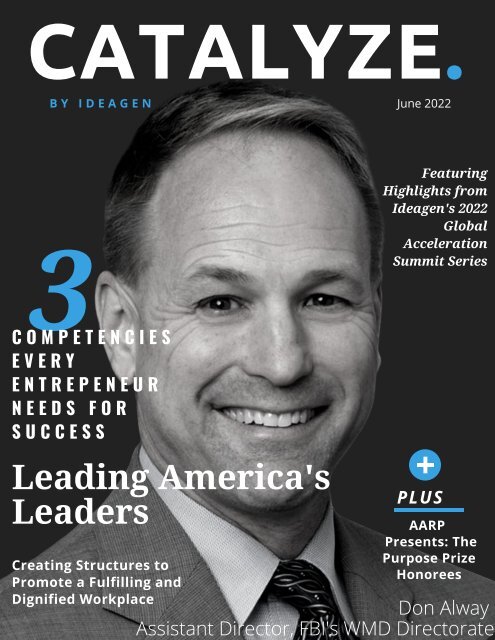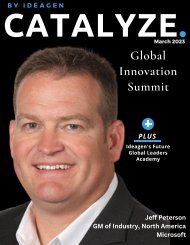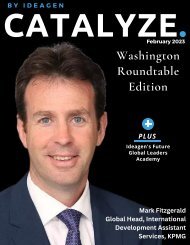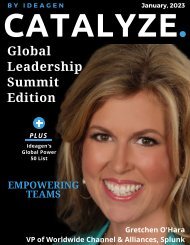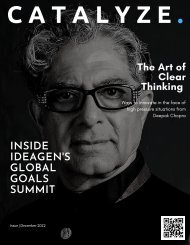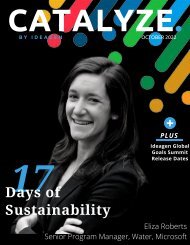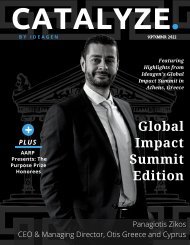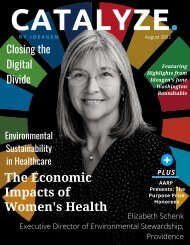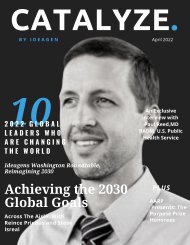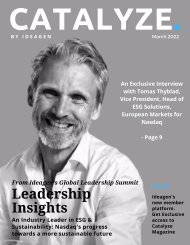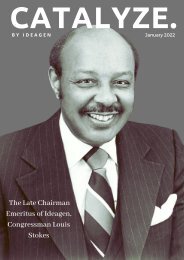Catalyze June 22
The June 2022 Edition of the Award Winning Catalyze Magazine by Ideagen Global is now available, join the millions of readers who are inspired by the exclusive interviews with global leaders and luminaries from the world's leading companies, ngo's and public sector organizations. Ideagen Global is "Presented Globally by Microsoft" - www.IdeagenGlobal.com
The June 2022 Edition of the Award Winning Catalyze Magazine by Ideagen Global is now available, join the millions of readers who are inspired by the exclusive interviews with global leaders and luminaries from the world's leading companies, ngo's and public sector organizations. Ideagen Global is "Presented Globally by Microsoft" - www.IdeagenGlobal.com
You also want an ePaper? Increase the reach of your titles
YUMPU automatically turns print PDFs into web optimized ePapers that Google loves.
CATALYZE.
B Y I D E A G E N June 2022
3
C O M P E T E N C I E S
E V E R Y
E N T R E P E N E U R
N E E D S F O R
S U C C E S S
Featuring
Highlights from
Ideagen's 2022
Global
Acceleration
Summit Series
Leading America's
Leaders
Creating Structures to
Promote a Fulfilling and
Dignified Workplace
PLUS
AARP
Presents: The
Purpose Prize
Honorees
Don Alway
Assistant Director, FBI's WMD Directorate
CATALYZE.
B Y I D E A G E N June 2022
3
C O M P E T E N C I E S
E V E R Y
E N T R E P E N E U R
N E E D S F O R
S U C C E S S
Featuring
Highlights from
Ideagen's 2022
Global
Acceleration
Summit Series
Leading America's
Leaders
Creating Structures to
Promote a Fulfilling and
Dignified Workplace
PLUS
AARP
Presents: The
Purpose Prize
Honorees
Jeff Schiefelbein
Chief Culture Officer, 5 Energy Group
CATALYZE.
B Y I D E A G E N June 2022
3
C O M P E T E N C I E S
E V E R Y
E N T R E P E N E U R
N E E D S F O R
S U C C E S S
Featuring
Highlights from
Ideagen's 2022
Global
Acceleration
Summit Series
Leading America's
Leaders
Creating Structures to
Promote a Fulfilling and
Dignified Workplace
PLUS
AARP
Presents: The
Purpose Prize
Honorees
Rebecca White
Director of Entrepreneurship, University of Tampa
CATALYZE.
B Y I D E A G E N June 2022
3
C O M P E T E N C I E S
E V E R Y
E N T R E P E N E U R
N E E D S F O R
S U C C E S S
Featuring
Highlights from
Ideagen's 2022
Global
Acceleration
Summit Series
Leading America's
Leaders
Creating Structures to
Promote a Fulfilling and
Dignified Workplace
PLUS
AARP
Presents: The
Purpose Prize
Honorees
Jim MacLennan
Vice President of Innovation, Hitachi
CATALYZE.
B Y I D E A G E N June 2022
3
C O M P E T E N C I E S
E V E R Y
E N T R E P E N E U R
N E E D S F O R
S U C C E S S
Featuring
Highlights from
Ideagen's 2022
Global
Acceleration
Summit Series
Leading America's
Leaders
Creating Structures to
Promote a Fulfilling and
Dignified Workplace
PLUS
AARP
Presents: The
Purpose Prize
Honorees
Ed Reno
Host of Ideagen's Ed Reno Series
CATALYZE.
B Y I D E A G E N June 2022
3
C O M P E T E N C I E S
E V E R Y
E N T R E P E N E U R
N E E D S F O R
S U C C E S S
Featuring
Highlights from
Ideagen's 2022
Global
Acceleration
Summit Series
Leading America's
Leaders
Creating Structures to
Promote a Fulfilling and
Dignified Workplace
PLUS
AARP
Presents: The
Purpose Prize
Honorees
Liz Fanning
Founder and Executive Director, CorpsAfrica
L E A D I N G A M E R I C A ' S L E A D E R S
T H E D E S I R A B L E Q U A L I T I E S O F A N F B I A G E N T , & T H E
A G E N C Y ' S P U R S U I T T O D I V E R S I F Y I T S P E R S O N N E L
Ed Reno:
As we explore leadership, I assume you work with what I'll
call type A's. They must be, obviously, very mission-driven,
goal-oriented, and high operators. What's your leadership
style around that type of individual? And how do you instill
a sense of purpose and culture when you've got some very
dynamic, strong individuals?
From: Donald Alway, FBI
Assistant Director; Weapons
of Mass Destruction
Don Alway:
It really is a team sport. Leading leaders is probably the best
way to describe it. We have folks that generally have come
from highly accomplished careers and are successful, and
now it's merging that talent and passion into a common
grouping for the shared purpose. My job is to hire the right
people, support them with the right resources and let them
do what they likely already would.
Reno:
I see. And do you find that there's any sort of particular skill
set for successful agents nowadays?
Alway:
I think having people that want to see their own success
through the success of the organization is key. We rely on
measuring ourselves by some metrics at times, and we're an
organization like many others that relies on showing our
value to Congress for resourcing.
CATALYZE MAGAZINE | 1
CATALYZE MAGAZINE | 2
L E A D I N G A M E R I C A ' S L E A D E R S
C O N T I N U E D . . .
Alway:
However, that's not the purpose of why we do what we do. So I think having folks that are surveybased
leaders that believe in our teams and that want to see their own success measured by how
well their subordinates do. Those are the type of leadership qualities we're looking for.
Sense of mission to protect fellow citizens, to do good for living, to leave an organization better
than they found it. A genuine sense of calling. It is not a job. It is not even a career. It's a calling.
There's gonna be sacrifices. There's gonna be hardships. That all comes with what's also a
rewarding experience that can't be measured by dollars.
Reno:
There's a push, I think globally, understandably to further diversify workforces.
Does the bureau have an approach to diversifying its workforce and tapping into the power that
comes from different backgrounds and approaches to things?
Alway:
So we're an organization of people. While we use technology to accomplish our mission, there
would be no FBI without the people behind it. We can't use systems to replace people in any
area. So those folks have to have a sense of commitment and belonging. And if they're not
reflective of the public they serve - if they don't have folks that understand that the FBI is theirs
and that it belongs to everybody - then we're failing our country and failing our organization. So a
sense of diversity in both the work and the people is critical to our success
Watch now
IDEAGEN
EU Global Summit
July 21, 2022 @ ACS Athens
Presented Globally by
Microsoft
In Collaboration with:
Ideagen Global "Presented Globally by Microsoft" and in
collaboration with ACS Athens and ALLILON.net and supported by
the American Hellenic Institute is pleased to present the Ideagen EU
Global Summit in Athens, Greece with this global forum for
audiences across the planet.
During this summit, we will highlight the importance of creating a
sustainable future from both a personal perspective and a societal
one through impactful leaders in your community for conversations
broadcast on the Ideagen TV Network, including Ideagen Radio and
Catalyze Magazine.
CATALYZE MAGAZINE | 3
GREECE ALIGNING
WITH THE
INTERNATIONAL
COMMUNITY
T H E O D O R O S B I Z A K I S ; D E P U T Y
C H I E F O F M I S S I O N , G R E E K
E M B A S S Y
George Sifakis:
There's no place for war in the 21st century. We are now in 2022. We've made so many strides in
healthcare, finance, and technology, and yet we're in the middle of this moment where we're
talking about war. A war that could potentially escalate and involve many other countries. What's
your take on that on a personal note?
Minister Bizakis:
It's not right, the pictures that we're seeing in 2022. We had the Second World War, a devastating
war not just in Europe, but also all around the planet. And it took many, many years to establish
the UN and to establish a world that would be based on rules And despite the fact that, of
course, we had the war in the former Yugoslavia and other regions of crisis, the international
community paid every effort to create conditions in order to prevent wars and to promote peace
and stability. And now it seems as if all these efforts are collapsing when we have, again, a war in
Europe with that devastating effect. This is unacceptable today in 2022. Nobody can implement
a policy of revisionism and the policy of imposing on another through military force. This is totally
unacceptable. And this is where Greece is aligning with the international community to make
this message even stronger.
CATALYZE MAGAZINE | 4
Health For A Better World
Dr. Rod
Hochman,
President of
Providence
ENVISIONING EYE HEALTH
FOR FUTURE UN
STRATEGIES
A S H L E Y M I L L S ; C E O O F T H E V I S I O N C O U N C I L
Adriana Sifakis:
Recently the United Nations General Assembly resolution made a commitment to eye
care. Can you talk a little bit about that and how the Vision Council plays a role?
Ashley Mills:
Yes, this was thrilling. A year ago, the General Assembly recognized Vision as a catalyst to
achieving the agenda in 2030, and several, if not all of the sustainable development goals.
It's a huge moment for us because it means that all of the world's countries recognize that
Vision has a role to play, and the lead SDG that this resolution recognized was to eradicate
poverty. So when I'm telling you, vision care is healthcare, and it very much is, but that
healthcare has implications far beyond putting a pair of glasses on someone's face. If you
can see, you can work. If you can see it can combat illiteracy, equity, employability, safety,
health, and quality of life, that's all in there, but it was a huge milestone for us. We are part
(Vision Council) of a group called Friends of Vision, a civil society group that supports the
ambassadors who are working on this issue. There's much more to come from us there; the
resolution's a huge step, and the opportunity now is to make sure we work with all of those
governments all around the world to make sure that we're able to actually deliver vision
care and solve these problems.
Watch now
CATALYZE MAGAZINE | 5
2022 Winners
Purpose Prize
Learn More
Bill Bracken
You live. You learn. You give back.
No one knows this better than people ages 50
and older, who have spent decades
accumulating a wealth of knowledge that only
life experience can bring. Armed with this
wisdom, they are a powerhouse of innovation
tackling some of the greatest societal
challenges of our time and inspiring others to
do the same.
The AARP® Purpose Prize® award supports
AARP's mission by honoring extraordinary
people ages 50 and older who tap into the
power of life experience to build a better
future for us all.
“AARP is honored to celebrate these
extraordinary older adults, who have
dedicated their lives to serving others in
creative and innovative ways,” said AARP CEO
Jo Ann Jenkins. “During these trying times in
our country and globally, we are inspired to
see people use their life experiences to build a
better future for us all.”
Ify Nwabuku
Raymond Jetson
Rita Zimmer
Alan Miller
CATALYZE MAGAZINE | 6
2021
Purpose
Prize
Fellow
Highlight
Liz Fanning
Founder and Executive
Director,
CorpsAfrica
Support CorpsAfrica
Learn More
CATALYZE MAGAZINE | 7
Liz Fanning
Founder and Executive Director,
CorpsAfrica
“I always say I never knew what I wanted to do but I spent my career preparing for it.
Also, don’t be afraid to fail. Just roll up your sleeves and get to work.”
The Peace Corps sends Americans to African countries, but CorpsAfrica uses talent that is
homegrown. We recruit, train and dispatch college-educated young Africans to remote villages in
their own countries, where they facilitate solutions to problems identified by local people. So far,
more than 300 volunteers have served in four countries — Morocco, Senegal, Malawi and
Rwanda — impacting an estimated 150,000 rural Africans. Our approach not only benefits the
villagers, it transforms the lives and life goals of our volunteers.
The problem I’m trying to solve
Some countries in Africa are among the poorest in the world. In several where we work, nearly
half the population lives below the poverty line. Meanwhile, Africa is rich in underutilized talent,
with hundreds of universities graduating educated youth who can’t find enough jobs to employ
them. By tapping their idealism and energy, CorpsAfrica empowers these young adults to be part
of the solution. Our volunteers spend nearly a year in a village, learning what the locals view as
their biggest needs and connecting them to organizations with the resources to help. Our wideranging
projects include wells, irrigation (including a recent, innovative solar-powered system),
toilets, self-sustaining kitchen gardens (750 and counting), and even an NBA-sponsored
basketball court to give kids in a refugee camp a productive activity. When COVID-19 broke out,
our volunteers were perfectly positioned to educate residents on the best ways to protect
themselves.
CATALYZE MAGAZINE | 8
THE WORK OF
CORPSAFRICA AND
STARTING AN NGO
CATALYZE MAGAZINE | 9
B Y : B A R B Q U A I N T A N C E , V I C E
P R E S I D E N T A A R P ,
E N T E R P R I S E A W A R D S
A N D L I Z F A N N I N G , F O U N D E R
& E X E C U T I V E D I R E C T O R A T
C O R P S A F R I C A
Liz Fanning:
It's like the Peace Corps, but we give college-educated, young Africans the chance to
serve like Peace Corps volunteers in their own countries. We have a month of preservice
training, and then it's 10 months of living in a remote high poverty community
with local people. Their role is unlike the Peace Corps in that our volunteers go to their
sites with no preexisting agenda. We train them in human-centered design, which is
sort of a structure to the facilitation process and problem-solving tools to help the
local people identify their highest priority development needs and to come up with a
project to address that need. The volunteers help the communities implement that
project by connecting them to resources. I think the most important lesson our
volunteers take away from their year of service is humility. It's really about not being
the savior themselves. They are not going to change the world themselves. These
projects don't happen by the volunteers. They happen through them. Their role is to
be the facilitator and the liaison, and really give ownership to the local people. So it's
really gotta be about what the local people want. That's probably the most important
aspect of CorpsAfrica, the most important core value, but it's also about locals helping
locals. Local people, helping local people rather than the outside saviors coming in,
being the ones with all the answers and all the funding. We're also committed to
creating a culture of philanthropy in Africa. So that development efforts are also locally
owned and locally led.
THE WORK OF CORPSAFRICA
AND STARTING AN NGO
CONTINUED...
Barb Quaintance:
What advice would you give to people who, not necessarily people who want to do
the work you do, but who are passionate about an issue or committed enough that
they want to begin their own work?
Liz Fanning:
I never wanted to start an NGO. I always thought there were too many NGOs in the
world and, you know, maybe go find an NGO that does something similar to what
you do and see if you can work with them to do it rather than starting your own
thing, which just brings on so much additional headache, I guess, and bureaucracy.
For us, there really wasn't an organization we could go to and nobody was doing it.
If you don't believe in it with your heart and soul, it's not gonna work because it
takes that kind of commitment and don't-give-up tenacity. I think that is the key
ingredient.
Purpose Prize
CATALYZE MAGAZINE | 10
CATALYZE MAGAZINE | 11
THE 3
COMPETENCIES ALL
ENTREPRENEURS
NEED TO BE
SUCCESSFUL
REBECCA WHITE
DIRECTOR OF ENTREPRENEURSHIP, UNIVERSITY OF TAMPA
My book is really about what an entrepreneur or an entrepreneurship graduate from a
university should really be able to see, do and share with the world. Its about
understanding what that means because it really goes beyond starting a business. This
entrepreneurial mindset, because like many others, I've applied this in organizations as
well as on my own. This idea of what an entrepreneur really is able to do is what drove
this book and the title of this book. And in the world of skill based development and
education, we have something we call competencies, and we focus on being able to
measure whether or not someone has developed certain competencies. So I became
interested in the idea of applying competencies to entrepreneurship. This has been
about a 10 year research project that started with a long list of competencies which
we were able to secure from research with hundreds of entrepreneurs. Over time we
were able to call that down to three competencies that successful all successful
entrepreneurs have. And that's what this book is about. See, Do, Repeat.
CATALYZE MAGAZINE | 12
THE 3 COMPETENCIES ALL
ENTREPRENEURS NEED TO BE
SUCCESSFUL CONTINUED...
One of the more creative and challenging things about writing a book is coming up
with a great title. So coming up with this title of See, Do, Repeat is kind of an
interesting story because the way that I teach entrepreneurship and the way that I
teach opportunity recognition includes this idea that we have to gather a lot of
material together and then allow our brain to process it: to connect the dots, to come
up with creations and innovations. So, like my students, I tried to walk the talk. The
title actually came to me when I was out running one day because I had done tons of
research, spent a lot of time trying to figure out how to share these three
competencies in a very simple way with a very large audience. I gave my brain the
opportunity to process what I was learning while I was out running and came up with
this idea of See, Do, and Repeat. See refers to the ability to recognize, identify and
recognize opportunities to see the world through an opportunity lens. Do refers to the
willingness to take action because entrepreneurship doesn't happen without that.
And repeat refers to the fact that virtually every entrepreneurial journey is going to
have a wide variety of challenges along the way. And so successful entrepreneurs are
able to execute past failure, which means again, that persistence and that willingness
to keep going. See, Do, Repeat, the practice of entrepreneurship, is the title that came
out of all of that.
VIEW A PREVIEW OF
SEE, DO, REPEAT
BUZZWORDS FOR MAKING YOUR
BUSINESS SUSTAINABLE
F R O M : J I M M A C L E N N A N , V I C E P R E S I D E N T ,
I N N O V A T I O N , H I T A C H I S O L U T I O N S
MacLennan:
Digital transformation. If you do a Google search, you can see that it's a relatively new
buzzword over the past 10 years. It's really spiked up in popularity. A lot more searches are
going on. And a lot of people are talking about what it means to do a digital
transformation or be a digital business. And I found that the easiest way to help that
conversation is to have a really simple framework - a simple way to define what it means
to be a digital business. It's five simple components. The first three are things you would
expect: systems and processes designed to automate internal operations, bring you closer
to your customers, and even information becoming part of the products that you sell. It's
really, you know, what you make, whom you sell it to and how you fulfill it. That's pretty
much business right there. The next important component is the data itself. And I'm not
talking about pulling all this information together. I'm saying, how do you, how does your
company get information out of that data and use it to make good business decisions?
And finally, the one component that most folks don't expect - the last component of a
great digital business - is your team.
The people inside of your organization connect with your customers and manufacture and
ship the products that you sell. It's an incredibly important piece of a digital business. Now
that we have a simple framework for digital business, we can start talking about all those
specific initiatives that we want to figure out how to make happen in our company. It's
easier to keep control of things and understand who's gonna take ownership and how
we're gonna prioritize things because they plug into this really simple framework. It's a
powerful way to sort of distill a tough-to-deal-with idea like digital transformation. And it
really helps. A lot of us went to another to try to make sense of it all. We went to
innovation and innovation's a buzzword, but really innovation was the key. Innovation was
the key to finding ways to apply digital technology for companies to be able to react
better and become resilient and understand how to deal with this big change of what
was going on. And it also allowed us to become more innovative. But my point is that a lot
of companies talk to me and say “My business is not innovative. I don't know how to do
that. It's just not in our culture and I can't figure out how to do it.” But there is a way to
engineer innovation inside of an organization. It's really five simple components.
CATALYZE MAGAZINE | 13
BUZZWORDS FOR
MAKING YOUR
BUSINESS
SUSTAINABLE
CONTINUED...
The first one is that you have to have an environment that allows for innovation. I'm
talking about the ability to collaborate, but you gotta invest in some tools, some
technology that people can apply, but just buying a little bit of software is not gonna
solve the problem. The next two pieces you have to have are creativity and curiosity.
What do these new technologies do? I'm going to invest some of my own time to learn
about these different digital things, so then I can use my creativity to understand that
if I understand the tools, I understand my problem space. I'm gonna come up with
some creative ways to apply that. But even that's not enough because this is not a task
to try to set up a big play playground, where everybody can play with the tools. There
has to be a critical challenge that we're trying to fix. Now, this could be a problem to
solve, or it could be an opportunity to realize, but it has to be something specific. And
you have to focus on the results.
Innovation is not taking months and months and months to play around with
something. No, let's set some time boxes. Maybe it's 30 days, 60 days, 90 days, but it's
something where you take a step back and say, look, great idea, great try. It's not
working. Maybe this is something we should either stop or double down on. But if we
put that kind of structure and put those kinds of cultural changes inside of an
organization, then any company can be innovative.
Sustainability seems to be the next thing that everybody wants to talk about. But
again, just like with digital transformation and digital business, people were having a
very tough time understanding what sustainability meant and how to apply it to their
business. And so I decided to take that five-step framework and expand it a little bit.
The five-component framework for a digital business allows me to take ideas and
apply them and figure out how they make sense inside of my organization.
CATALYZE MAGAZINE | 14
CONTINUED...
No business ever does all of these things, but they know how to prioritize and pick the
right things and get the right people aligned. Well, the same thing can happen with
sustainability. With sustainability, I'm just extending the model for three simple ideas.
The first one would be environmental. All things about understanding the raw materials
and the impact that your operations have on the environment, the raw inputs that
come in that your suppliers bring in, and how and what you do to the environment as
it's going back out.
The next one would be economic. That's where you get into using sustainability
techniques to understand the overall cost of operations and optimizing the cost of
operations for your business. This is usually where all the ESG conversations go about
reporting requirements, smart cities, and things like that. And finally, community.
Community is a really important piece of this sustainability conversation because what's
at the center of this picture is the folks on your team, the people that work with your
customers, et cetera. And you've got customers themselves that you're trying to market
the idea that sustainability is about growth. How are you gonna grow into new markets
unless your customers understand and see what you're doing? It's important to have a
purpose-driven organization. And so now when I understand all these different topics
that are considered sustainability, now I can actually apply them to my framework and
understand how they fit in my understanding of my organization. And a lot of
companies will say, “well, we're not interested in that. You know, we're not interested in
clean water. Why? Because we're a water company.” The idea that you can take from
this is, first, to find a really simple framework because everybody makes things too
difficult. There are simple frameworks that you can use to understand your business,
and how to apply these ideas. And change is gonna happen, but it's that combination
of innovation and resilience that's going to reduce the impact and let you live to
another day. If innovation is tough, it can be engineered. Don't give up on the idea that
you can't introduce innovation to your organization and actually make it work. And then
finally, the last two key ideas: Resilience is a reactive way to make sure your company
and your organization can live to see tomorrow; Sustainability is a proactive way to
make sure that your company can live forever.
CATALYZE MAGAZINE | 15
CATALYZE MAGAZINE | 16
CREATING STRUCTURES TO
PROMOTE A FULFILLING AND
DIGNIFIED WORKPLACE
B Y : D R . C H R I S T I N E G A L I B S E N I O R D I R E C T O R
O F P R O G R A M S A T T H E I O N &
J E F F S C H I E F E L B E I N C H I E F C U L T U R E O F F I C E R
F O R 5 E N E R G Y
Galib:
I’d love to hear your thoughts on how your work relates to SDG goal eight.
Schiefelbein:
I think, first of all, to share a little bit of a why; in the last 24 years of my journey
between launching nonprofits and for-profits, helping religious organizations, and
helping corporate organizations, I've realized these fundamental truths about human
beings in work. What's really neat is everything kept pointing to these same truths
about what gives somebody fulfillment, where work becomes dignified, and how as
leaders, we can create structures and environments that not just promote that but
acknowledge that work is a place of great formation. And so one of the ways that I've
found that is with this idea of a stakeholder mentality. We hear a lot now starting to
bubble up about stakeholder capitalism, about conscious capitalism, and they all kind
of have these same tenants, but it's just a recognition that an organization needs to
exist for a higher purpose and not just for the shareholder or better said for
shareholder value. We got crushed because of 50 years of bad rhetoric in the world
because of the 1960s business model of everything about the corporation should be
about making money for its owners, and that's just fundamentally false.
CREATING STRUCTURES TO PROMOTE
A FULFILLING AND DIGNIFIED
WORKPLACE CONTINUED...
You can really break that down and ask yourself, why does the human body exist? It has to
pump blood and breathe oxygen, but that's not a good reason to exist, and neither is
making money a good reason to exist. It's an outcome and a necessary piece, just like
blood and oxygen are necessary to my body. So this idea is okay if you have a higher
purpose, and then you start to dig into the stakeholder model, everybody your company
touches, and even the ones that are second or third rung to your company, are being
impacted either positively, maybe in a neutral way or negatively by the decisions you
make, the supply chain decisions, the compensation decisions, the policies that you
create, the way that you show up for or against what's happening in your local community
or with the environment. And so this idea is that every single stakeholder group tied to
your company in any way should win, like win, win, win, win. And that is this law of
mutuality where we're all going to be better.
There's more to be gained by us all being in a winning situation, instead of these hard
negotiations of, ‘let me see if I can squeeze out every last penny or bit of work out of my
employees.’ So at Five, at this energy company, our stakeholders include our employees,
our clients, our vendors, our suppliers, the community, and the environment. Then we
even go so far as to say our industry, in general, is one; whether that's a strategic partner or
it's truly a competitor, that's part of our stakeholder map that we're trying to make our
entire ecosystem better for having existed. And I'll tell you one of the greatest
compliments is when someone comes home from working here for their first month, and
their spouse or their kids or their parents say you are a better, happier, more productive,
more fulfilled family member, and there must be something about the way that you're
being coached or challenged or held to account that is causing you to be nurtured and
have the chance to thrive. This is a long-winded way of saying stakeholder mentality is a
huge part of this, and it shows up everywhere in our organization and in all these
organizations. However, it's also the place that if you take your eye off of it, you can start to
have this murky gray area of making decisions that feel one-sided or take advantage of a
situation, and that could lead to short term gains financially but also really hurt and erode
the long term health of your company.
CATALYZE MAGAZINE | 17
IDEAGEN®
Washington Roundtable
Ideagen's Washington Roundtable brings together high-level
individuals and organizations to discuss some of the world’s most
vexing issues through the lens of sustainability to examine how
proper leadership can help us better enact global change. We
focus on leadership and policy, targeted towards decision markers
in Washington DC.
Streaming July 21, 2022
Ideagenglobal.com | Presented Globally by
CATALYZE MAGAZINE | 12
ALTERNATIVE
APPROACHES TO
SOLVING THE SDG'S
A N I N T E R V I E W W I T H P A T R I C K
T H E R O S : F O R M E R U S
A M B A S S A D O R T O Q A T A R
Patrick Theros:
I don't think we could further the Sustainable Development Goals simply by working
with one country. What you need is for the United States to assemble a collective of
like-minded countries. Countries that while, not exactly the same, are committed to
seven to ten of the goals, and regard the others as okay is about the best you are going
to do at the beginning. It's a question of building a sufficient mass of countries around
the world. They can't all be in one continent. Perhaps the one thing that should define
these countries is a commitment to popular participation in government. Maybe you
don't call it democracy as we have it, but countries that have the interests of their
people at heart because their people are the ones who decide who rules them So then
once you have this coalition together - and it's not gonna be the - then you can start
working on advancing the goals. In some cases, some countries are better at advancing
some goals than other countries at others. It has to be a coherent effort in which some
countries take the lead on some things. The United States being the United States is
obviously gonna bear a larger burden than almost any other country in that coalition,
but you can't do it by yourself.
George Sifakis:
And as a former ambassador, you've seen things that many have not, and you've been
involved in so many different negotiations and dialogues with other nations and
leaders across the planet. What do you believe is the most important quality to ensure
peaceful, mutually beneficial partnerships amongst nations?
CATALYZE MAGAZINE | 19
CATALYZE MAGAZINE | 20
ALTERNATIVE APPROACHES TO
SOLVING THE SDG'S
CONTINUED...
Patrick Theros:
A single important quality is the ability to understand the other nation from its own
point of view. What are its interests? What is its historical background? What are its
particular problems? Let me give you a current example. The EU is pushing for a
complete embargo on Russian oil and later on Russian gas, which is fine in principle,
but it affects different countries in different ways. So before you can impose such an
embargo you have to get everybody to buy-in. And sometimes the country that suffers
the least that thought up this idea because they're suffering the least has to make
some real sacrifices to help the country that's suffering the most.
A good example is that something like 80 or 90% of Czech gas comes from Russia.
The Czech pipeline system isn't connected to any other pipeline except pipelines
going to Russia. This is a very sort of specific and narrow approach, but other countries
all have their own interests at play, and doing a "one size fits all" approach is very
difficult unless the countries that suffer least make the sacrifices to help the countries
that suffer more.
I D E A G E N ' S P O W E R 1 0 L I S T
10 global leaders who are Changing the World in 2022
Mark Fitzgerald
KPMG
Barb Quaintance
AARP
Steve Israel
Michael Best
Strategies
Dr. Sidhant Gupta
Microsoft
Tomas Thyblad
Nasdaq
Microsoft
Ashley Haynes-Gaspar
Peggy Pelonis
ACS Athens
Jake Herway
Gallup
BJ Moore
Providence
Nick Larigakis
American Hellenic
Institute
CATALYZE MAGAZINE | 21
Editor's Note
Dear Ideagen Global Friends and Colleagues,
We are just about mid-year in 2022 and Ideagen Global, Presented
Globally by Microsoft, continues to maximize our efforts with a
relentless commitment to convene the world's greatest minds from the
world's leading companies, NGO's, and the public sector to address the
world's most vexing issues. In 2021, Ideagen TV content reached over
100 Million People across the planet with our ubiquitous content
distribution including inspiring interviews and custom programming to
create awareness and Global Partnerships to Achieve the Goals.
2022 is already promising to be an #EPIC year with upcoming
hybrid/live events across the planet planned including Athens, Greece,
New York and many other global destinations! Join the movement at
IdeagenGlobal.com for all of the latest updates.
Sincerely,
GEORGE SIFAKIS
GEORGE SIFAKIS
Editor-in-Chief & CEO
Ideagen
CATALYZE MAGAZINE | 22
COOPER HENDERSON
Lead Publication Editor
DANIEL KERNS
Co-Editor and Chief of Staff
WILL MARTIN
Co-Editor and Senior Fellow
Pictured Top to Bottom
76th session of the UN
UN New York
MIchael Best's Rep. Steve Israel
Top Left: BJ Moore at HIMMS Conference
